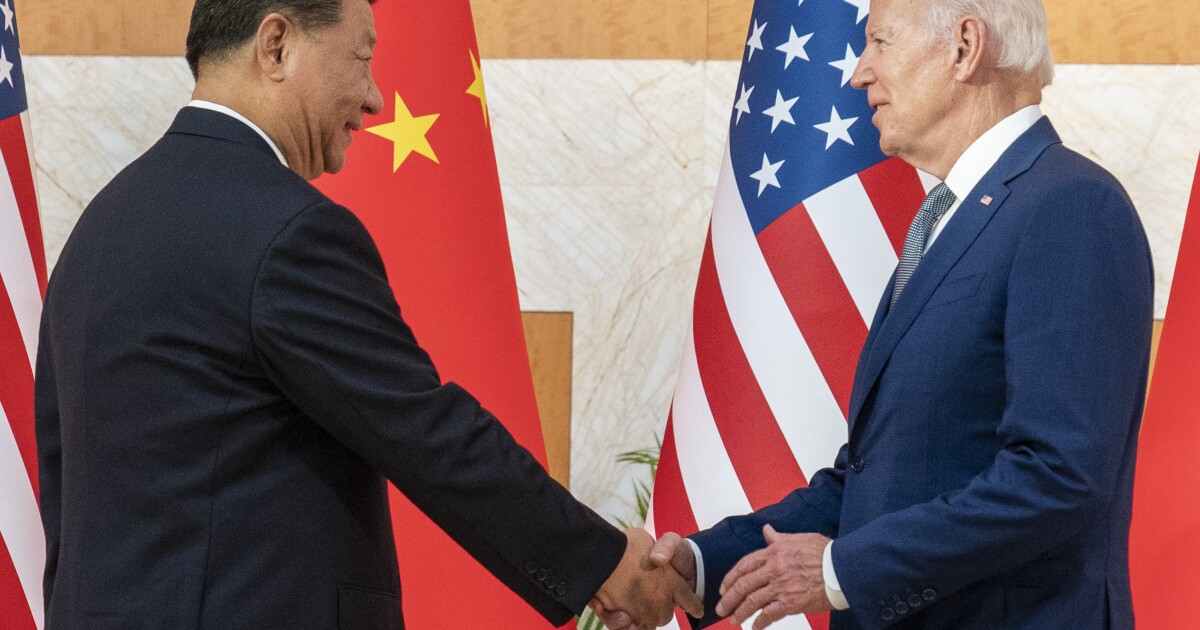

President Joe Biden’s meeting with his Chinese counterpart Xi Jinping presents a valuable opportunity to reset military relations between the two superpowers, analysts believe.
Republicans, meanwhile, have urged the president to confront the communist leader on serious problems such as the People’s Republic of China’s aggressive behavior in the South China Sea. Otherwise, the meeting is nothing more than “zombie engagement.”
BIDEN ON THE BRINK: DEMOCRATS START TO PANIC ABOUT WHETHER THE PRESIDENT IS A SUREFIRE 2024 WINNER
The two leaders will meet next Wednesday for the first time in a year during the Asia-Pacific Economic Cooperation summit, or APEC, in San Francisco, California. On the agenda, according to White House press secretary Karine Jean-Pierre, is a discussion about “the continued importance of maintaining open lines of communication.”
Sourabh Gupta, a resident senior fellow at the Institute for China-America Studies, told the Washington Examiner that the resumption of military communication between the two sides would likely be “the primary takeaway or the deliverable that will” result from the Xi-Biden meeting.
Beijing cut off military-to-military communications with Washington last year in protest of then-Speaker Nancy Pelosi’s (D-CA) trip to Taiwan, the significance of which includes the possibility of an unintended escalation or an accident between U.S. and PRC forces in the region.
Department of Defense officials warned last month that there had been a dramatic increase in the number of unsafe or reckless maneuvers near U.S. aircraft and naval vessels in the Pacific region in recent years. There were more such incidents, nearly 200, in the past two years than in the previous decade, Ely Ratner, the assistant secretary of defense for Indo-Pacific security affairs, said at the time the information was released.
“I think there could be quite a few takeaways from their meeting, but these are nothing of a major or substantive level. There will be no major breakthroughs or takeaways on what’s happening in the South China Sea. Policies are going to change. What’s happening on the Korean peninsula, it’s not going to change. What’s China’s role in Ukraine, Russia or Gaza, Israel? Nothing’s fundamentally going to change.” Gupta added. “But there are chances of beginning to accumulate small wins at the lower level.“
He referenced working together to curb the proliferation of fentanyl and the concerns of artificial intelligence as subjects the leaders could likely come to agreements on, and he said he believes the unsafe aerial and maritime encounters will be “dimmed down somewhat.”
Republicans on the House Select Committee on Strategic Competition Between the United States and the Chinese Communist Party, formed earlier this year to address Beijing’s growing influence, listed 10 action items they want Biden to press Xi on during the meeting in a recent letter sent to the president.
“Despite repeated concessions from Washington over the past year, Beijing has made none and continues to threaten core U.S. interests,” Rep. Mike Gallagher (R-WI), chairman of the committee, told the Washington Examiner. “At this week’s meeting, the administration should walk away from the table if the CCP proves unwilling to address even the most basic issues in the relationship, such as immediately releasing all Americans wrongfully detained in the PRC, ceasing dangerous and unjustifiable intercepts of American forces, and halting operations in Taiwan’s Air Defense Identification Zone east of the Median Line. Short of clear commitments on this low-hanging fruit, APEC needs to be the end of the road for zombie engagement.”
A senior administration official told reporters, “We expect the leaders will discuss [the] strategic direction of the bilateral relationship, the importance of maintaining open lines of communication, including mill-mill. We expect they’ll cover a range of regional and global issues, too, such as Russia’s invasion of Ukraine, and the Israel-Hamas conflict.”
A congressionally mandated report released in October found that the Chinese military is “continuing to quite rapidly modernize and diversify and expand its nuclear forces,” a senior defense official described at the time. The department estimates China has “more than 500 operational nuclear warheads as of May of this year” and believes Beijing’s buildup will exceed 1,000 by 2030.
The administration official also said it’s “possible” that the two leaders would discuss the spread of fentanyl, artificial intelligence, and the handful of Americans whom the government believes are being wrongfully detained in China.
CLICK HERE TO READ MORE FROM THE WASHINGTON EXAMINER
“In an authoritarian system like China’s, it’s important to speak directly to the man with all the power — Xi Jinping,” Rep. Michael McCaul (R-TX), the chairman of the House Foreign Affairs Committee, told the Washington Examiner. “But Biden should not treat this as a ‘first step’ or talk for talking’s sake. We have sent dozens of U.S. government officials to Beijing with nothing to show for it. Biden must demand real deliverables, like releasing Mark Swidan or shutting down companies that manufacture fentanyl precursors in China, before he rolls out the red carpet for Chairman Xi.”
Swidan is one of a handful of Americans who are detained in China, many of whom face extended sentences. He has been held for more than 10 years on drug charges that he denies, while the U.S. government has given him the wrongfully detained designation, which allows for specific government resources to be allocated to his case.






